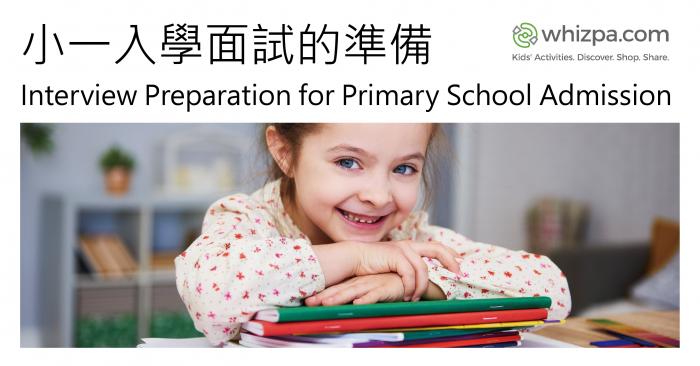
Interview Preparation for Primary School Admission
September to December every year is the peak period for primary school interviews in direct subsidy and private schools. It is one of the significant challenges for parents and children.
Some parents have started to enrol in preparation classes as early as one year before the interview so that children would have adequate time to familiarize themselves with the format of questions and master interview skills. On the other hand, some parents prefer to let their children just be themselves and attend the interview with a free mind. There is no fixed formula for a successful interview, so opt for something most suitable for your child. Again, however, prior preparation is highly suggested. While it's difficult to know what exact questions will be asked, we can group activities and questions into a few major categories so parents will have some ideas about what to prepare.
Warm-up Chit Chat
This is the initial part of the interview. In light of the young age (4 to 5 years old), to create a relaxed atmosphere, the teacher will chat with the children in a friendly manner, with topics covering daily life and habits, such as what they like to play with, what their favourite foods and TV programs are, and what books they read... The teacher will also observe the children playing with the simple game offered to test their problem-solving techniques.
Most children will find this part easy and crack it without much effort. However, suppose your child is relatively shy, you may create more opportunities for him to interact with friends and relatives, which will help your child get used to communicating with people outside the family. Parents can also engage more with children at home and let them express their thoughts freely without much interruption or criticism.
Group Activities
Due to a large number of applicants, four to eight children will be engaging in group activities such as building blocks, doing handcrafts, painting, or playing board games. Simultaneously, teachers will observe and assess their social and problem-solving skills. Why not pull out a board game with which your children can engage with friends and family? By experiencing winning or losing, they will have the chance to understand that outcome is not the most important thing while enjoying the process and showing respect and appreciation to your opponent counts.
Story Telling
Children will be asked to tell a story based on several pictures or complete a story by providing an ending. The ability of comprehension, creativity, and language usage will be tested. With the aim of boosting confidence and improving articulation skills, it is suggested to have similar practice at home by introducing picture books to your children and encouraging them to create stories based on bold imagination and spinning their own experiences.
Written Test on Subjects
Some academically focused schools will include Chinese, English, and Math tests to understand children's academic level in each subject. It seems daunting for children to be tested formally at a young age, but parents do not need to panic, and it's unnecessary to pressure the children. Instead, cultivating a good reading habit and guiding the children to think more logically will significantly benefit their future study in various subjects.
Problem-Solving Questions
Schools will provide different scenarios for children to think about how they will deal with to gauge their common sense and general knowledge. Some of the scenarios are:
- If you see someone injured on the street, what will you do?
- If a stranger treats you with candy, what will you do?
- If you get lost on the street, what will you do?
- What will you do if there is a fire?
- What number will you dial if there is an emergency?
- If your siblings want the toys you are playing with, what will you do?
The questions are mainly about everyday life. So, spending time with your children watching TV news, reading newspapers, and discussing current affairs on a daily basis will definitely help.
Parent-Teacher Meeting
The meeting between teachers and parents is usually set at the final stage, and children will sometimes be involved. This is regarded as the last round of interviews. The purpose of the meeting is to understand parents' expectations for their children and the school and to see if their teaching style aligns with the school's teaching philosophy. Therefore, it is crucial to fully understand the school's values, teaching philosophy, and curriculum prior to the interview and communicate with the school with your genuine perspective. With their extensive experience, the teachers in the admission committee will assess and match up with the right children and the school.
The primary school admission interview can last up to several months. So, prepare early and remember not to pressure your children too much. They will find the most suitable school in the end by being true to themselves and suitably equipped.
To prepare your child early, explore some interview-preparation classes now.








